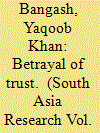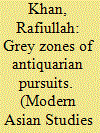| Srl | Item |
| 1 |
ID:
075668


|
|
|
|
|
| Publication |
2006.
|
| Summary/Abstract |
This article analyses why and how the princely order, once considered the bulwark of British rule, came tumbling down so rapidly within a few months in 1947, following the intervention of Lord Mountbatten, a royal cousin, who the princes thought would support them in preserving their rule and privileges. How far were the princes themselves to blame and what role did Mountbatten play? Through a careful re-examination of available sources this article argues that the princes, though unable to act together, trusted the British Crown to protect their rights and interests as promised, but were mistaken in believing that Mountbatten would uphold Britain's treaty obligations regarding the princely states.
|
|
|
|
|
|
|
|
|
|
|
|
|
|
|
|
| 2 |
ID:
193617


|
|
|
|
|
| Summary/Abstract |
This article discusses and analyses the Barger archaeological expedition of 1938 to the princely state of Swat. It argues that archaeology in princely, as well as in British, India did not originate and develop in a unilinear manner. This understanding is in line with the recent realization of variations in the historiography of native India. Given this, an attempt has been made to situate the Swat state in relation to British paramountcy. Miangul Abdul Wadud, the first British-recognized ruler of the state, was aware of colonial power relations and had a friendly attitude towards the British. He dealt with Swat’s archaeology with political and dynastic expediencies in mind. Since there was no proper legal and institutional dispensation in place in the area, the Frontier government officials and the political administration at Malakand treated the Barger expedition as a local matter, beyond the legal jurisdiction and disciplinary apparatuses of the colonial state. The Archaeological Survey of India (ASI) and the related laws were, thus, kept out of the entire enterprise. All this ensured a smooth transfer of antiquities to England at a time when strong legal-institutional and ethical dimensions to archaeology were in place within British India and in some princely states.
|
|
|
|
|
|
|
|
|
|
|
|
|
|
|
|